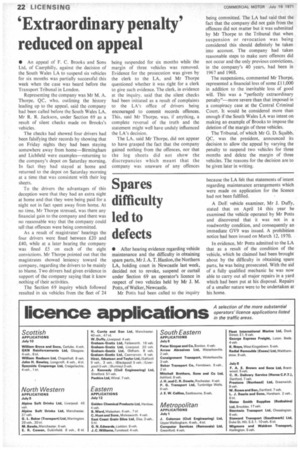'Extraordinary penalty' reduced on appeal
Page 24

If you've noticed an error in this article please click here to report it so we can fix it.
• An appeal of F. C. Brooks and Sons Ltd, of Caerphilly, against the decision of the South Wales LA to suspend six vehicles for six months was partially successful this week when the case was heard before the Transport Tribunal in London.
Representing the company was Mr M. A. Thorpe, QC, who, outlining the history leading up to the appeal, said the company had been called before the South Wales LA. Mr R. R. Jackson, under Section 69 as a result of silent checks made on Brooks's vehicles.
The checks had showed four drivers had been falsifying their records by showing that on Friday nights they had been staying somewhere away from home—Birmingham and Lichfield were examples—returning to the company's depot on Saturday morning. In fact they had stayed at home and returned to the depot on Saturday morning at a time that was consistent with their log sheets.
To the drivers the advantages of this deception were that they had an extra night at home and that they were being paid for a night not in fact spent away from home. At no time, Mr Thorpe stressed, was there any financial gain to the company and there was no reasonable way that the company could tell that offences were being committed.
As a result of magistrates' hearings the four drivers were fined between £20 and £40, while at a later hearing the company was fined £5 on each of the eight convictions. Mr Thorpe pointed out that the magistrates showed leniency toward the company, regarding the drivers to be mainly to blame. Two drivers had given evidence in support of the company saying that it knew nothing of their activities.
The Section 69 inquiry which followed resulted in six vehicles from the fleet of 24
being suspended for six months while the margin of three vehicles was removed. Evidence for the prosecution was given by the clerk to the LA, and Mr Thorpe questioned whether it was right for a clerk to give such evidence. The clerk, in evidence at the inquiry, said that the silent checks had been initiated as a result of complaints to the LA's office of drivers being encouraged to commit records offences. This, said Mr Thorpe, was, if anything, a complete reversal of the truth and the statement might well have unduly influenced the I.A's decision.
The LA, said Mr Thorpe, did not appear to have grasped the fact that the company gained nothing from the offences. nor that the log sheets did not show the discrepancies which meant that the company was unaware of any offences being committed. The LA had said that the fact that the company did not gain from the offences did not matter but it was submitted by Mr Thorpe to the Tribunal that when suspension or revocation was being considered this should definitely be taken into account. The company had taken reasonable steps to make sure offences did not occur and the only previous convictions. in the company's 40 years, had been in 1967 and 1968.
The suspensions, commented Mr Thorpe, represented a financial loss of some £11,000 in addition to the inevitable loss of good will. This was a "perfectly extraordinary penalty"—more severe than that imposed in a conspiracy case at the Central Criminal Court. It would be considered more than enough if the South Wales LA was intent on making an example of Brooks to impose the deletion of the margin of three vehicles.
The Tribunal, of which Mr G. D. Squibb, QC, was the president, announced its decision to allow the appeal by varying the penalty to suspend two vehicles for three months and delete the margin of three vehicles. The reasons for the decision are to be given later in writing.




























































































